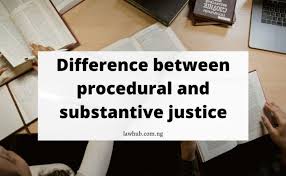THE DIFFERENCE BETWEEN PROCEDURAL JUSTICE AND SUBSTANTIVE JUSTICE
Some terms can be really confusing, but a close view will help. This post seeks to explain the difference between procedural justice and substantive justice.
First and foremost, it is expressly important that we get a grasp of what is meant by justice.
Then, we can be in a good position to understand the stand of the two conceptions.
That is, procedural justice and substantive justice.
According to Merriam-Webster Dictionary, justice is the maintenance or administration of what is just especially be the impartial adjustment of conflicting claims or the assignment of merited rewards or punishments.
In the case of R v Sussex Justices, ex parte McCarthy, Lord Gordon said.”It is not merely of some importance, but it is of fundamental importance that, justice should not only be done, but should manifestly and undoubtedly be seen to be done.”
See also: Cases for Theories of Law
Procedural Justice, as the name indicates, is a means of achieving justice through following strict procedures of fairness.
It is the idea of fairness in the process that resolves disputes and allocate resources.
Procedural and Substantive Justice: Meaning & Difference
It is primarily concerned with the fairness and the transparency of the process by which decisions are made. Procedural Justice holds that fair procedure leads to equitable outcome.
Hence, seeking justice in accordance with the details or procedures of the law is procedural justice.
On the other hand is Substantive Justice.
It maintains that the law to be used as a measure of justice must be just and fair. Substantive is a product of the word ‘substance’, which denotes – ‘of the essence or essential of a thing’.
So, Substantive justice is therefore the liberal and purposive interruption of laws, in order to do justice. Especially, where a formal, strict, and narrow application of the law will lead to hardship, absurdity, or injustice.
Hence, while Procedural Justice focuses on carrying out decisions according to the statement of the law, Substantive Justice is interested in probing whether or not the laws are just themselves.
In all, Procedural Justice follows the process of fairness. Substantive Justice, on the other hand, checks if the fairness of laws that led to the process.
I hope I helped with this explanation. Of course, you should do more research to get the full gist of what these terms mean.
Don’t forget to subscribe and drop your comment(s). Much love.
Credit:
Merriam Webster Dictionary
‘The Nigerian Legal Method’ by Ese Malemi


Leave a Reply